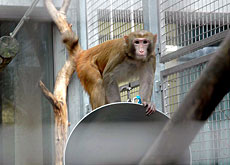Brains take a week off to show their research

In Switzerland and around the world, neuroscientists are busy presenting their research to the general public as part of Brain Week.
swissinfo caught up with Stephanie Clarke, president of the Swiss Society for Neuroscience, to discuss just how important it is for scientists to communicate their findings.
Brain Week has taken place for the past ten years in Europe, organised by the European Dana Alliance for the Brain. The association’s goal is to help the public understand the importance of this type of research.
swissinfo: People know about brain diseases such as Parkinson’s and Alzheimer’s, but is the information about researchers’ work getting through?
Stephanie Clarke: I have the feeling that there are more and more articles on breakthroughs in brain research being published in the media than say there were 15 years ago.
For me as a clinician, and for my patients and their families, this is vital as it is important that people know about disabilities that are the result of brain lesions and what can be done to counter them.
swissinfo: Where are Swiss researchers making the most impact now?
S.C.: Many groups are working on one of the most fascinating questions in neuroscience today: how the brain adapts to different situations. When a child grows or when we learn something, our brain changes. When there is a lesion, the brain adapts to allow recovery. These processes are being studied using different methods such as [computer-based] imaging that show us how the brain reorganises itself.
There is also a lot of research being carried out in molecular neuroscience, at the interface of genetics and neuroscience.
swissinfo: Brain Week is supposed to raise awareness about research. Do you feel that researchers are getting the support they need?
S.C.: Support is at a good level in Switzerland, but we could certainly do even more research if there was extra funding available.
swissinfo: There have been recent controversies about animal research in neuroscience. Is this likely to cause problems?
S.C.: There are ethical concerns about animal experimentation. It’s important to ask just how far we can go.
What is perhaps not understood is how far away we are from understanding how the brain and the nervous system function, and how they work in people. Humans are different from simple animal models, such as mice, so we need research involving, for example, non-human primates – monkeys. What can be done, what is acceptable, needs to be discussed.
There is sometimes the feeling that we no longer need extra knowledge about the brain. This is wrong. If one keeps in mind that we need extra knowledge to help find a cure for disease or understand how the brain works, then we have to take this into account when reviewing authorisations for animal experiments.
swissinfo: Do scientists have to communicate better about the need to do this kind of research?
S.C.: It’s important to communicate this not just to the general public, but also to ethicists and member of ethics committees – who are often not specialists – so they can understand the logic of this research.
swissinfo: There is a perception among the general public that animal research is a brutal business. Does this indicate that public opinion and fundamental research are opposed?
S.C.: I think much more information is needed. Even if I am not involved in animal research myself, I know my colleagues are opening up their facilities to the public when they can. They are also trying to talk about their work with the media so that there is an independent mediator.
swissinfo-interview: Scott Capper
“Neuroscience in Society” is the theme of this year’s Brain Awareness Week, which runs from March 12-18.
It is organised by the European Dana Alliance for the Brain, an organisation of more than 170 leading brain scientists, including five Nobel laureates, from 27 countries.
The association, launched in 1997, is modelled on the US-based Dana Alliance for Brain Initiatives.
In Switzerland, events will be held in Geneva, Lausanne, Bern, Basel, Fribourg, Aarau, Zurich and Lugano.

In compliance with the JTI standards
More: SWI swissinfo.ch certified by the Journalism Trust Initiative











You can find an overview of ongoing debates with our journalists here . Please join us!
If you want to start a conversation about a topic raised in this article or want to report factual errors, email us at english@swissinfo.ch.